Recent appearance at Purdue symposium on AI and future of war (video)
 Wednesday, May 29, 2019 at 1:41PM
Wednesday, May 29, 2019 at 1:41PM 
 Wednesday, May 29, 2019 at 1:41PM
Wednesday, May 29, 2019 at 1:41PM  Wednesday, February 17, 2016 at 11:57AM
Wednesday, February 17, 2016 at 11:57AM  THERE WILL ALWAYS BE TWO TYPES OF HUMANS: THOSE WHO SEEK TO "SAVE" THEMSELVES AND THEIR FUTURE (BY LIVING CAREFULLY) AND THOSE WHO SEEK TO "SPEND" THEIR LIVES (AND LITERALLY THEIR BODIES) AS AGGRESSIVELY AS POSSIBLE. On the former, think of vegan ascetics; on the latter, think of career military or NFL players. There is no right choice – just the choice. To quote the heavy-metal band Metallica, My lifestyle determines my death style. Except maybe now, thanks to emerging bio-technologies, it no longer will. At first glance, this is an unmitigated blessing: worn-out or diseased or damaged organs and bones replaced with organic replacements crafted from your own cells! But what happens to human behavior when people start to realize that today's extreme risks can be covered by emerging technological fixes? Are we suddenly braver? More foolhardy? More given to addictions? Less virtuous? In sum, does this form of new-school resilience (break it, replace it) somehow diminish the old-school variant (overcoming damage)?
THERE WILL ALWAYS BE TWO TYPES OF HUMANS: THOSE WHO SEEK TO "SAVE" THEMSELVES AND THEIR FUTURE (BY LIVING CAREFULLY) AND THOSE WHO SEEK TO "SPEND" THEIR LIVES (AND LITERALLY THEIR BODIES) AS AGGRESSIVELY AS POSSIBLE. On the former, think of vegan ascetics; on the latter, think of career military or NFL players. There is no right choice – just the choice. To quote the heavy-metal band Metallica, My lifestyle determines my death style. Except maybe now, thanks to emerging bio-technologies, it no longer will. At first glance, this is an unmitigated blessing: worn-out or diseased or damaged organs and bones replaced with organic replacements crafted from your own cells! But what happens to human behavior when people start to realize that today's extreme risks can be covered by emerging technological fixes? Are we suddenly braver? More foolhardy? More given to addictions? Less virtuous? In sum, does this form of new-school resilience (break it, replace it) somehow diminish the old-school variant (overcoming damage)?Whatever the pathway, it seems clear that the nature of humanity's physical resilience will be transformed – profoundly augmented by biotechnologies that allow us to walk away from our mistakes, sufferings, bad luck, bad DNA, bad behavior, etc.
Two stunning examples, the first on 3-D printing:
A new method of 3-D printing can produce human-sized bone, muscle, and cartilage templates that survive when implanted into animals, researchers report.
"It has been challenging to produce human scale tissues with 3-D printing because larger tissues require additional nutrition," Dr. Anthony Atala from Wake Forest School of Medicine, Winston-Salem, North Carolina told Reuters Health by email.
His team developed a process they call "the integrated tissue and organ printing system," or ITOP for short. ITOP produces a network of tiny channels that allows the printed tissue to be nourished after being implanted into a living animal.
The researchers produced three types of tissue - bone, cartilage, and muscle - and transplanted it into rats and mice.
Five months after implantation, the bone tissue looked similar to normal bone, complete with blood vessels and with no dead areas, the research team reported in Nature Biotechnology . . .
Results with 3-D printed skeletal muscle were equally impressive. Not only did the implants look like normal muscle when examined two weeks after implantation, but the implants also contracted like immature, developing muscle when stimulated . . .
"We are also using similar strategies to print solid organs," [Atala] added.
That's the human hardware, so to speak. Now on to the software . . .
Miniature brains [see image above] that show electrical activity akin to “a primitive type of thinking” could revolutionise how some drugs are tested and reduce the need for animals in research, according to scientists who have developed the structures.
Each ball of human brain cells - in all about the size of the head of a ballpoint pen - “represents more or less a two-month-old brain” of a foetus, Prof Thomas Hartung of Johns Hopkins University said, presenting the work at the American Association for the Advancement of Science conference . The cultures also show “spontaneous electrophysiological activity” – their neurons zap off electrical signals to each other without prompting.
“It’s starting to produce a primitive type of ‘thinking,’” Hartung said, though he stressed that the operation is only mechanical. “Obviously there’s no input or output. It is meaningless electrical activity but the neurons are trying to communicate with each other.”
Scientists first developed miniature brains in test tubes in December 2013, but Hartung said that his team has managed to standardise the new “mini-brains” – meaning they can grow hundreds of uniform brain cultures in a single petri dish, rather than a few cultures each grown according to their distinct genetic codes . . .
Hartung said the neural activity, which can be measured with an EEG-like device, creates a “third dimension” for studying the effects of drugs: not only can researchers examine how drugs affect the health and function of brain cells, they can also see what drugs do to neural activity.
An obvious good in terms of drug testing and particularly in attacking brain-centric conditions and diseases like Alzheimer's. But note how quickly the doctor dismissed the notion of actual "thinking" being triggered. That inevitability, plus the comparison to a fetus, starts to feel a lot more God-like.
But, frankly, it's all God-like. In human history, there are two great brakes on behavior: one is the reality of the human body (you will pay for your bad or risky behavior!) and belief in the afterlife (and, if you don't, then God will make you pay for eternity). For now, we seem to be messing only with the first equation – the hard and fast one that only the most genetically fortunate can escape. But yes, we will eventually get around to the second one.
In both instances, though, we're leveling a playing field that's been magnificently tilted throughout human existence, and that is going to revolutionize our sense of risk – both individually and collectively. If you think that technology can save your skin (literally), you'll be more willing to push all manner of envelopes. At first, it will be – as usual – only the rich who can afford such a mindset. You see that today in cosmetic surgery, but these technologies will take that advantage to an entirely new level.
At some point, access to such technologies becomes a political issue – not unlike the shadowy question of who should be prioritized today for donor organs (the virtuous disease-sufferer or the person who destroyed their liver with alcohol). Eventually, expect that access to be defined a "human right" – upon threat of political revolution.
Again, whatever the pathway, these technologies will spread. They will be "democratized" like all before them. And they will dramatically alter human behavior – first individually and then in organizations. Legal and political systems will need to change in response.
And the notion of human resilience will never be the same again.
 Friday, November 20, 2015 at 1:33PM
Friday, November 20, 2015 at 1:33PM ON WEDNESDAY TIME POSTED A JUDICIOUSLY GAUGED OVERVIEW of the near-term threat posed by ISIS across the United States (“The State of Terror Defenses in the U.S.”). I say “judicious” because it avoids the usual fear-mongering hype so typical of these stories in the immediate aftermath of any notable terror strike. The story notes that Americans have about a 1-in-20-million chance of dying in a terror strike (the historical record to date), but that, as a significant “soft power” (our economic, social, media, financial, etc. strengths), we naturally present a lot of soft targets (iconic sights, critical infrastructure, social gathering places) to terror groups ...
READ THE ENTIRE POST AT:
 Thursday, March 21, 2013 at 9:22AM
Thursday, March 21, 2013 at 9:22AM  NYT story on cyber attacks on two major SouKo banks - presumably by NorKo.
NYT story on cyber attacks on two major SouKo banks - presumably by NorKo.
I think this becomes the new brinksmanship/signaling in the digital age, meaning it's truly a virtual form of warfare and not a real warfare domain per se. It's easier and more clear than the usual diplo protests.
So we have this as a fifth vein of cyber (offensive/offending).
The five categories, in my mind, are:
What I don't see is cyber as a separate offensive warfare category - i.e., that and that alone as THE attack. You use as enabler in traditional attack, or its virtual warfare at best (remember that virtual means "not X").
That's why I don't find cyberwarfare so novel or weird or supremely trumping as some do. It's just a lot of old modalities updated and augmented - nothing more.
 Friday, March 8, 2013 at 9:39AM
Friday, March 8, 2013 at 9:39AM 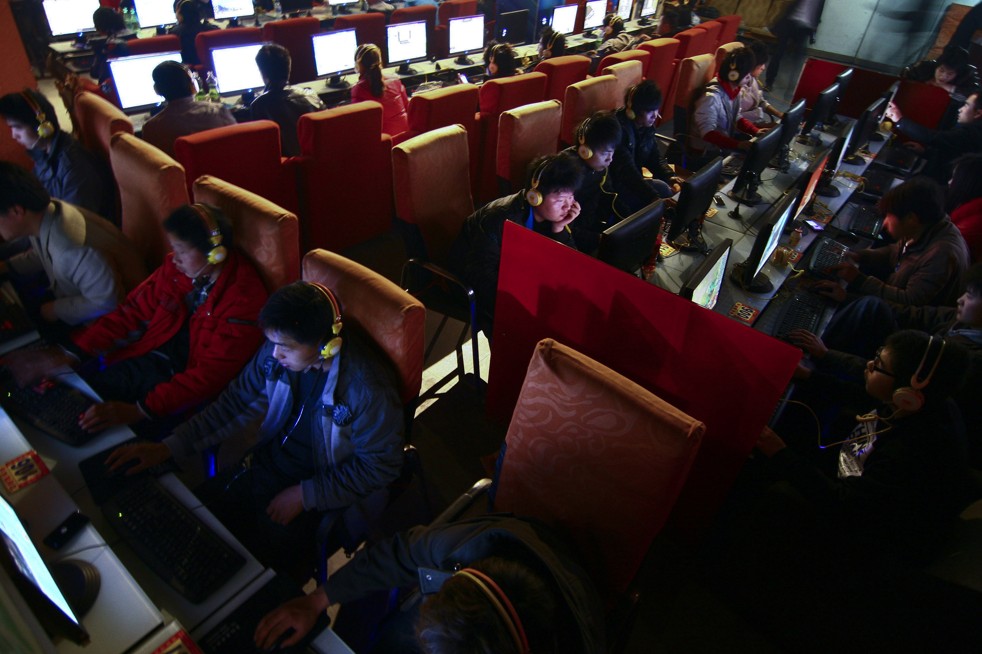 WAPO article on Rice U. study (richly detailed and seemingly very robust in data capture and analysis on how the Chinese gov deletes micro-blog posts).
WAPO article on Rice U. study (richly detailed and seemingly very robust in data capture and analysis on how the Chinese gov deletes micro-blog posts).
First point article makes is that China's flow of tweets is several times that of Twitter, so we're talking massive amount. It seems gov cuts about 12% of them.
Here are the envisioned procedures:
Explicit filtering: a banned keyword triggers an automated system, which stops the message from posting and warns the user he has violated policy. Implicit filtering: a banned keyword triggers an automated system, which delays the message until a censor can see it and tells the user there’s a server error in the meantime. Camouflaged posts: a banned keyword triggers an automated system, which keeps the message from displaying publicly but shows the user it has posted. Backwards repost search: either a human censor or an automated system discovers a problematic posts and deletes all versions of it (re-posts, etc.) across the network. Backwards keyword search: a censor notices a problematic keyword and deletes a number of its instances across the network. User monitoring: certain users who are censored frequently are flagged for closer scrutiny. Account closures: censors shut down problematic accounts entirely. The study counted 300 such closures of 3,500 accounts in a one-month period. Search filtering: a regularly updated list of terms cannot be searched. Public timeline filtering: sensitive topics are edited out of the general Weibo “fire hose.”
While we may celebrate the technical achievement (most posts killed in less than 10 minutes), we must remember the tremendous effort required and the larger reality that banned conversations occur all the time. All the government succeeds in doing is clamping down on public transmission.
The topics show how defensive the government is - from the geostrategic to the completely mundane:
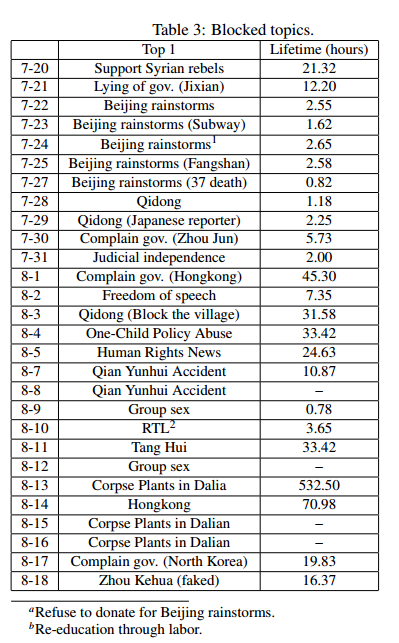 Okay, so Syria trends one day and then gov corruption comes next, but then look at the rainstorms cluster, because that's just people bitching about how poorly the gov responded to the frickin' rain! I mean, that is sad.
Okay, so Syria trends one day and then gov corruption comes next, but then look at the rainstorms cluster, because that's just people bitching about how poorly the gov responded to the frickin' rain! I mean, that is sad.
What's sad about this effort is that the gov does seek to respond on some level to these issues, so it listens. It just can't allow that listening or response process to be acknowledged - much less the initial bitching.
You may spot strength in that, or some BS about the "Chinese way of governance" and so forth, but all that fades away as the Chinese people modernize their society and exhibit more and more competence in running their own daily lives, businesses, and the larger society itself.
By engaging in all this clamping down of speech, all the government does is signal that it's not to be held responsible for its failures, and that determination blocks the naturally positive expansion of nationalism in the direction of societal self-improvement, meaning the gov is making itself less stable and thus more brittle over time by refusing to respect its own people and their righteous complaints.
In historical terms, this is spitting in the wind and wondering why there always seems to be saliva in one's eyes. The government is simply refusing to converse with a public that is becoming more self-deterministic - through economic success - with each passing day.
Again, there is no singular Chinese/Asian path in this regard. The same breakdown of the collective mindset that happened in the West happens in the East. Modernization/industrialization is simply that powerful.
 China,
China,  development,
development,  technology | in
technology | in  Citation Post |
Citation Post |  Email Article |
Email Article |  Permalink |
Permalink |  Print Article
Print Article  Wednesday, February 20, 2013 at 8:39AM
Wednesday, February 20, 2013 at 8:39AM 
Bjorn Lomborg writing that 8m kids worldwide have died over the past 12 years because Western and local activists prevented the arrival of rice that is genetically modified to possess an abundance of Vitamin A:
Finally, after a 12-year delay caused by opponents of genetically modified foods, so-called “golden rice” with vitamin A will be grown in the Philippines. Over those 12 years, about 8 million children worldwide died from vitamin A deficiency. Are anti-GM advocates not partly responsible?
Golden rice is the most prominent example in the global controversy over GM foods, which pits a technology with some risks but incredible potential against the resistance of feel-good campaigning. Three billion people depend on rice as their staple food, with 10 percent at risk for vitamin A deficiency, which, according to the World Health Organization, causes 250,000 to 500,000 children to go blind each year. Of these, half die within a year. A study from the British medical journal the Lancet estimates that, in total, vitamin A deficiency kills 668,000 children under the age of 5 each year.
Yet, despite the cost in human lives, anti-GM campaigners—from Greenpeace to Naomi Klein—have derided efforts to use golden rice to avoid vitamin A deficiency.
Great piece by a brilliant guy.
These fights are like every other one in a developing environment: West wants South to avoid its own past
"mistakes" and demands they develop in "pure" fashion. Result is stunted development and wasted lives. Truth of history is this: if you want people to care about the environment, get them richer first and then they'll care. Until then, expect a local rise in pollutions and other things because there really aren't any magical short-cuts on development. Plus, quite frankly, the damage done while still poor vastly outranks the cumulative damage inflicted by the income/industrial rise. But basic point: don't be a hypocrit and expect the poor to atone for your past excesses.
On the GMO, the West's enviro case is far weaker. There is no evidence of substantial risk and plenty of evidence of substantial gain. This is simply rich people who can afford organic pretending they're doing good by telling the poor to hold out for it - or else.
Expect a lot more fights as climate change exacerbates droughts in food-vulnerable regions and well-meaning Northerners do their best to prevent the application of genuine solutions.
 Wednesday, February 13, 2013 at 12:27PM
Wednesday, February 13, 2013 at 12:27PM 
Missed yesterday on 20-hour workday that featured 4 flights - sweet! Just to go to fricking Norfolk from Indy. Such is the cost of being able to sleep in your own bed both nights (I have had all the hotels in this world that I care to). Unbelievable logistics that left my head aching from all the up-and-down. I am going to build a future that has minimal flying and maximum time on the waves. Count on it.
MS and Huawei do a GM-SAIC (my fave example of getting yourself some Chinese to capture the fortune at the bottom of the pyramid).
Gist:
Microsoft, taking aim at the world’s fastest-growing smartphone market, said on Monday that it would team up with Huawei of China to sell a low-cost Windows smartphone in Africa.
The phone, called the Huawei 4Afrika Windows Phone, will cost $150 and initially be sold in seven countries.
Slick connection, yes?
Africa is the world’s fastest-growing region for smartphones, with an average sales growth of 43 percent a year since 2000, according to the GSM Association, an industry trade group based in London.
In sub-Saharan Africa alone, 10 percent of the 445 million cellphone users have smartphones, but that is expected to increase rapidly as operators expand high-speed networks.
By 2017, most consumers in South Africa will be using smartphones, up from 20 percent last year, according to the GSM Association. In Nigeria, the continent’s most populous country, the outlook for sustained growth is even greater, with smartphone penetration projected to reach just 30 percent by 2017.
The World Bank says that roughly a quarter of the one billion people on the continent are middle-class wage earners, the target group that Microsoft will try to reach with the Huawei phone, Mr. de Sousa said.
“Africans are generally quite conscious of brand, quality and image,” he said.
Some serious bottom-of-the-pyramid stuff.
Think about it: MS and Wal-Mart making these big moves in Africa.
Biggest analytic mistake I've ever made was overestimating how slowly (yes, my original post had me mis-stating this) Africa would embrace globalization and succeed with it. Totally blew it.
And that mistake taught me: the bias of the national security type toward pessimism is a huge analytic weakness WRT globalization. It really means Washington, by and large, doesn't have a clue - PNT worst of all.
And that's a weird realization, when you remember that this era of globalization is a US-led creation, but now, here we are, and the progenitor and long-time bodyguard has lost its analytic ability to understand its own creation.
 Wednesday, January 30, 2013 at 10:24AM
Wednesday, January 30, 2013 at 10:24AM 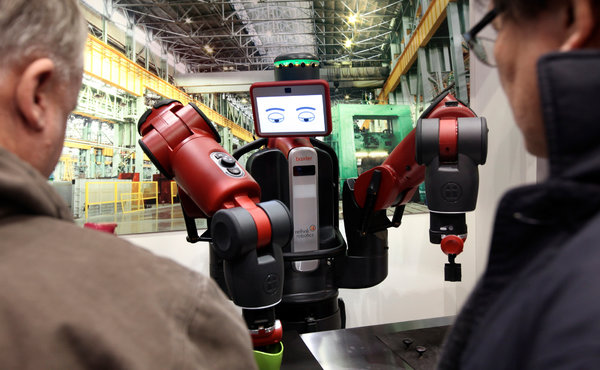
Subject is, do robots kill more jobs than they create?
We've approached this question many times in various Wikistrat sims, and they are many thoughts on the subject.
In a macro sense, the nightmare scenario is silly: no society is going to job-destroy its way to rule by robots. The amateur economist in me believes life just migrates into new areas, so there are plenty of jobs creating robots and economic activity moves on to new challenges/spheres/what have you.
But in the near-term sense, people's perceptions of the disruptive churn (sure to happen) matter a whole lot.
So this NYT report by the always smart John Markoff on a recent robotic industry conference that sought to allay some of these fears (robots everywhere!).
Some counter-arguments:
Hmm. Not exactly decisive, but you get the idea. Nobody wants to own the world's most manpower-intensive manufacturing sector - except maybe Bangladesh. So there's no way to go except onward and upward, as my Dad used to say. Manufacturing, if highly productive, still wins and creates wider wins in your economy.
But yeah, you still have to beat the next guy - and his robot.
 Monday, October 1, 2012 at 12:19PM
Monday, October 1, 2012 at 12:19PM

From FT story about advances in cancer treatment.
Me? I see a fairly scary map that says higher cancer frequency is sure to spread rapidly over next couple of decades as massive global middle class comes online in emerging and developing markets.
What this map tells me is high rates of cancer come with economic advance, meaning we're looking at a vast global industry within a generation.
 Sunday, July 22, 2012 at 1:20PM
Sunday, July 22, 2012 at 1:20PM 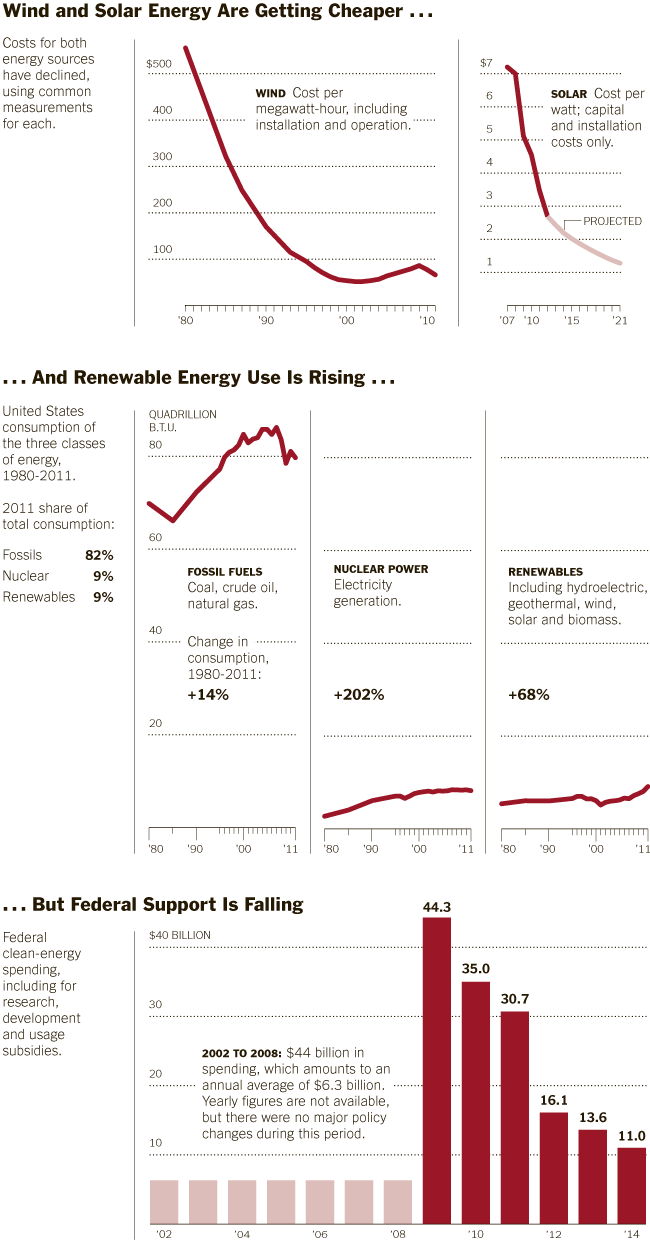
US experiencing warmest year on record and 13 hottest years (going back to 1880) for the planet have all occurred since 1998.
David Leonhardt (whom I like a lot and always read) writing in NYT speaks of a non-punitive vector that seems to be emerging among the big players:
Behind the scenes [of the disappearing public debate on global warming], however, a somewhat different story is starting to emerge — one that offers reason for optimism to anyone worried about the planet. The world’s largest economies may now be in the process of creating a climate-change response that does not depend on the politically painful process of raising the price of dirty energy. The response is not guaranteed to work, given the scale of the problem. But the early successes have been notable.
Over the last several years, the governments of the United States, Europe and China have spent hundreds of billions of dollars on clean-energy research and deployment. And despite some high-profile flops, like ethanol and Solyndra, the investments seem to be succeeding more than they are failing.
The price of solar and wind power have both fallen sharply in the last few years. This country’s largest wind farm, sprawling across eastern Oregon, is scheduled to open next month. Already, the world uses vastly more alternative energy than experts predicted only a decade ago.
Even natural gas, a hotly debated topic among climate experts, helps make the point. Thanks in part to earlier government investments, energy companies have been able to extract much more natural gas than once seemed possible. The use of natural gas to generate electricity — far from perfectly clean but less carbon-intensive than coal use — has jumped 25 percent since 2008, while prices have fallen more than 80 percent. Natural gas now generates as much electricity as coal in the United States, which would have been unthinkable not long ago.
The successes make it possible at least to fathom a transition to clean energy that does not involve putting a price on carbon — either through a carbon tax or a cap-and-trade program that requires licenses for emissions. It was exactly such a program, supported by both Barack Obama and John McCain in the 2008 campaign, that died in Congress in 2010 and is now opposed by almost all Congressional Republicans and some coal-state and oil-state Democrats.
The real goal, according to one scientist, is the emergence of disruptive technologies that push the planet "down" the hydrocarbon chain (wood-->coal-->oil-->gas-->renewables & hydrogen).
The more we shift from threatening fines to promising record profits, the migration will occur as it should.
Fascinating for me to watch a dozen years after I ran that global warming-focused "economic security exercise" with Cantor Fitzgerald atop World Trade Center One.
NOTE: the falling USG support for renewable energy research is why the influx of China investment is so important.
 China,
China,  Europe,
Europe,  US,
US,  global warming,
global warming,  technology | in
technology | in  Citation Post |
Citation Post |  Email Article |
Email Article |  Permalink |
Permalink |  Print Article
Print Article  Thursday, July 19, 2012 at 11:57AM
Thursday, July 19, 2012 at 11:57AM 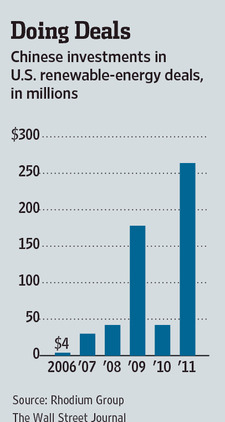 Nifty WSJ full-page report in mid-June entitled, "Beneath a war of words, money paints a different China-U.S. picture." The subject? Chinese investments in US renewable energy efforts.
Nifty WSJ full-page report in mid-June entitled, "Beneath a war of words, money paints a different China-U.S. picture." The subject? Chinese investments in US renewable energy efforts.
Just like in the case of hydraulic fracking, we see the Chinese eager to collaborate.
Naturally, as the less advanced technology economy, the Chinese are eager to go beyond collaboration into . . . ahem . . . aggressive collaboration, let's say. But let's be honest: that's the incentive for the less-technologically gifted party in any technological investment. For the more advanced party, the goal is an expanded pool of opportunity over time:
Read the headlines and you find a war of words between the U.S. and China over clean energy, with the two countries trading barbs over whether Chinese solar-panel makers are dumping their wares onto the U.S. market at prices so low they're illegal. Follow the money more broadly, however, and you see something different: clean-energy investors and executives from the two countries starting to do deals.
Chinese businesses, typically with Beijing's support, are beginning to buy stakes in U.S. clean-energy companies and projects, often with Washington cheering. The deals span technologies from cleaner ways to burn coal to cheaper ways to use renewable power.
Each side has reasons to expand this capital flow. The Americans get the Chinese money and, with it, access to China's vast market, which is far hungrier for clean-energy innovation than the U.S. The Chinese get U.S. technology to help sate their soaring energy demand, and a place to invest that looks positively low-risk compared with their home turf.
As for the fears? Money talks - no matter the language.
One reason is economic. Federal stimulus money for the energy industry is tapering off, and other federal clean-energy subsidies, many of which failed to deliver enough bang for the buck, are likely to get pared back, too. More than ever, U.S. clean-energy companies could use the help of China's investors and consumers.
Another reason is environmental. Many clean-energy technologies are getting cheaper but are still too expensive to compete against conventional fossil fuels. The only way they stand much chance of gaining real scale is if the world develops and deploys them in the most economically efficient way: across national borders. Moreover, if American clean-energy technologies aren't deployed in China, where air pollution is thick and greenhouse-gas emissions are rising, then whatever cleanup those technologies accomplish on U.S. soil won't much matter.
Thank God for the logic of businesspeople. Imagine if the Pentagon could aspire to such thinking.
 China,
China,  FDI,
FDI,  US,
US,  global economy,
global economy,  technology | in
technology | in  Citation Post |
Citation Post |  Email Article |
Email Article |  Permalink |
Permalink |  Print Article
Print Article  Monday, July 9, 2012 at 11:55AM
Monday, July 9, 2012 at 11:55AM 
Series at Small Wars Journal on military innovation by Thaddeus Jankowski, long-time reader, source and colleague.
From the start:
Introduction
In 2006-2007 I was one of the first few officers within U.S. Central Command to initiate the comprehensive Mine Resistant Ambush Protected (MRAP) vehicle program as we know it today—for all the Services. MRAPs rapidly became the largest land acquisition program in DoD history, comparing favorably in the history of American warfare to toolsets such as Higgins boats, F16s/F18s, A10s and LAVs in terms of breadth of use and overall importance. Since thousands are alive today because of innovations like this, a few perspectives from an actual innovator of this and other technologies may help the Pentagon better understand technology in wartime. On the battlefield, military officers have embraced change, rapid maneuver and chaos; now we must learn to extend these time-based theories to the support establishment.
My experience initiating MRAPs, along with many other important new devices of counter insurgency warfare, suggests that little has changed since Col. Burton wrote the words above. From 2006 to 2010, I systematically and repeatedly advocated for something that was common in civilian businesses but lacking in the Department of Defense: application of maneuver warfare principles to the support establishment. We needed a disciplined, transparent, rapid technology initiation process.
The opening piece is a great one. The other four articles in the series are coming out one per week over the next four weeks. All will be worth reading.
 Saturday, June 23, 2012 at 10:36AM
Saturday, June 23, 2012 at 10:36AM  Interesting WSJ piece on how aid projects are working to spread Kindles around Africa much in the same manner as the recent "one laptop per child." Many of the same problems, many of the same good intentions, but a number of deltas worth mentioning.
Interesting WSJ piece on how aid projects are working to spread Kindles around Africa much in the same manner as the recent "one laptop per child." Many of the same problems, many of the same good intentions, but a number of deltas worth mentioning.
The laptop per kid thing always struck me as overkill amidst a cellphone revolution. The problem I still have with cellphones is one of their great tricks: you can be illiterate and use one quite well - thus the cellphone's reputation (deserved) as the greatest economic development tool of all time. If you could read, my God the things you could suddenly do! And if you couldn't, my God the things you could suddenly do anyway!
But just as a lot of people worry about the poor literacy of young people in developed societies - thanks to all these devices, I worried about the same in developing. The writing skills of Millennials is - by generational standards - simply awful. That's why I encourage so much reading and - more importantly - writing among my kids (all of which I personally edit whenever they give me the chance, so I can impart the same basic lessons my sister Cathie gave to me when she edited all my papers in college before I turned them in). Good writing is becoming a lost art, and good writing starts with good reading of good writers - followed by application.
That's why this article caught my eye. I still learn a lot about writing all the time - and always will, because I still read a lot (more and more fiction). My fear with one-laptop was that we'd short-circuit a lot of useful learning, but with Kindles, which give you access to endless books and can go for a week on a good charge, you're filling young people's time and space with material that will ultimately advance them by developing their minds.
Plus, as the article points out, with built-in Internet, Kindles are basically big mobiles, and everyone knows where those technologies can take people in otherwise "hostile infrastructure" environments.
Having just turned 50 and thinking about what I want to do with the next five-decade tranche, I do find myself drawn to efforts that will have catalytic impact in developing/emerging economies. I have spent a great deal of my life fretting over the have/have-not thing, which is why - as a young man - I fell in love with globalization and its capacity to fuel the "Great Convergence" that progressively heals the Great Divergence of 1800-2000 (in income globally).
No, I don't see myself in aid efforts per se (although I have grand hopes for a philanthropic career at some point), but rather in the sort of infrastructure breakthroughs (still in that Development-in-a-Box mode) that are supremely catalytic. There's just so much to work with right now, what with all the South-South transactions taking off.
I honestly cannot understand anyone pining for a past age. We live in the best of worlds any human has yet enjoyed. The problems we face are the best we've ever had, and there are so many good tracks of human progress to pursue.
I feel lucky to be 50 right now - at this point in time.
 Thursday, May 24, 2012 at 12:03AM
Thursday, May 24, 2012 at 12:03AM 
WSJ story on how wearable glasses become the new computer interface.
A couple of generations after that (or maybe faster), all this hardware goes inside - and simultaneously losese its metal and becomes biological in content. Once you can surf the web from within your head, all sorts of fun and bad stuff follows, as hacking becomes its own threat of mind control. But people will augment their own bodies because that's the next evolution.
That reality, combined with nanotechnology allowing for more and more nets to be interwoven with our landscapes, is the primary reason why I don't see a future where such technology is housed within "serving" robots who, per the sci-fi genre, eventually turn on us. I think that whole concept is misguided.
That's not to say that robots won't matter, because they will in all sorts of ways. They just won't infantilize us by their presence, and they won't be the receptical for the really intimate technologies, which we will take into our bodies.
 Wednesday, April 25, 2012 at 12:02AM
Wednesday, April 25, 2012 at 12:02AM  Interesting WSJ piece on how Snoop Dogg and Dr. Dre are testing out a touring approach at the Coachella festival that sees him on stage with a hologram recreation of Tupac Shakur - he of many posthumous albums. The guy has been dead for 16 years.
Interesting WSJ piece on how Snoop Dogg and Dr. Dre are testing out a touring approach at the Coachella festival that sees him on stage with a hologram recreation of Tupac Shakur - he of many posthumous albums. The guy has been dead for 16 years.
Technical wizards claim "This is not found footage. This is not archival footage. This is an illusion."
One imagines a well-designed avatar that's detailed enough to work at a visual distance in a dark auditorium/arena. It uses the same technology that the company in question, Digital Domain, employed to render the "younging" Brad Pitt in "The Curious Case of Benjamin Button." Done live, I suppose it's a high-end version of Disney's Haunted House ride. The basic trick, says the piece, goes all the way to Victorian England.
If you saw the most recent Mission Impossible movie, Ethan Hunt employs something like this when breaking into the Kremlin.
What would you pay to see a dead figure "live" on stage? I am sure we'll find out over the coming years.
Still, as someone who does public speaking, it's hard not to be intrigued at the possibilities.
 Monday, April 2, 2012 at 9:39AM
Monday, April 2, 2012 at 9:39AM
Given this administration’s resurging plans for regional missile defense schemes in both Europe and Asia, President Barack Obama’s recent open-mike admission to Russian President Dmitry Medvedev that he will have more freedom in his national security decision-making once he wins re-election is not a comforting thought. For a guy who promises “a world without nuclear weapons,” Obama seems awfully intent on incentivizing both Russia and China to field some more.
Read the entire column at World Politics Review.
 China,
China,  Iran,
Iran,  US Military,
US Military,  nuclear weapons,
nuclear weapons,  technology | in
technology | in  WPR Column |
WPR Column |  Email Article |
Email Article |  Permalink |
Permalink |  Print Article
Print Article  Monday, March 12, 2012 at 9:38AM
Monday, March 12, 2012 at 9:38AM
As someone who thinks long and hard about global futures, I participate in a lot of professional forums where experts discuss the growing complexity of this world and question the ability of existing political systems, both democratic and authoritarian, to handle it. Some professionals, like Thomas Homer-Dixon, fret about an “ingenuity gap,” while regular readers of this column can attest to my frequent accusation that today’s political leaders lack “strategic imagination.” In short, we’re all arguing that politics isn’t keeping up with economics, much less technology.
And it scares us.
Read the entire column at World Politics Review.
 Thursday, February 2, 2012 at 11:39AM
Thursday, February 2, 2012 at 11:39AM 
After the success of the "China as Africa's de facto World Bank" simulation, we start moving expressedly into a series of sims aimed to flesh out the logic of the world's first crowd-sourced strategy book, the proposal for which we're now circulating in NYC. It was about time for me to gin up another, and I was really looking to do something different because I feel like I got my "vision" out in the trilogy. Plus, I wanted to do something long-term in its thinking. More details later as things unfold.
For now, we tee up the first of about a half-dozen major sims that will explore the drivers of a particular future world order that I became intrigued with as a result of last summer's Wikistrat Grand Strategy Competition. To me, how the NorthAm energy boom (question mark suggests nothing in this world is a given) unfolds is one of the major global uncertainties. North America can get it right or wrong on a host of levels, and since we're the inventors of these fracking revolution, the QWERTY effect would be huge, triggering a host of possible future pathways from fabulous to self-desructively nasty in terms of the environment and/or whether or not this great gift becomes an excuse for bad geostrategic choices by the U.S., China, Europe, Brazil, India, Russia - the big six we're focusing on here. You can say, it's a simple projection: it works or it doesn't. But the secondary and tertiary pathways that are revealed in this two stage process (NorthAm leads, others follow or ignore) are varied and immense in their capacity to make global stability better or worse.
So, naturally, I'm pretty pysched about the sim. One thing to go and read a bunch of books and try to get smart enough to cover this in a book, but another to turn loose dozens-to-hundreds of virtual co-authors in a competitive space to brainstorm all the possibilities.
Especially exciting for this sim: we now have senior experts stepping in and providing big-time ideas. Dr. Anne-Marie Slaughter, just out from the Kennan job at State (Policy Planning) under Obama, joined Wikistrat weeks back and she brings not just a wealth of experience and keen insight, she's also a not-too-closeted enthusiast for this sort of social networking as a tool to drive new thinking and change old thinking. She's already made a huge contribution to the sim that lays out, in a very clever way grounded in real-world vehicles, how a positive path in NorthAm could go global (as a fellow optimist, my attraction to her scenario was immediate, not because it was rosy per se, but because she elucidated why, given the parameters, this was the best forward-moving deal for the universe of public and private-sector actors working this policy space now in the U.S.).
Other senior experts piping in with their own scenarios include: Gary Hunt, president of Tech and Creative Labs, a tech mash-up that moves software solutions into the energy vertical market; and Chris Cox from Gesellschaft für Konsumforschung (GfK), Germany's oldest consumer research org (Chris comes with an energy focus on the fmr USSR realm).
But, as always, the coolest outlier ideas come from the Wikistrat rank and file, and that's the way we love it: "big firm"/senior experts with the go-to-market pillar concepts that structure the sim, and our "sea of entrepreneurs"/younger analysts with all the just-on-the-edge-of-plausibility stuff that most of us seniors have had beaten out of us by experience and bad bosses. Already there's been a nice cluster of jaw-dropping ideas out of this bunch, many of which see major players gaming the process very cleverly (both in a nice and nasty way).
I've been chiming in throughout on the scenarios ginned up to date (about two dozen). Each results in a wiki page that gets fleshed out across a dozen or more fields, to make sure we're collectively thinking out the scenario to the degree of robustness. I had given the pool of analysts my notional master narratives (simple frameworks for putting all these scenarios into "bins") and they've responded nicely by distorting the implied framework with all sorts of surprises I hadn't anticipated. At the end of the week I'll array and string together all these scenarios and rejigger the master narratives to cover enough of them for the next phase of the sim to unfold: brainstorming competiting notions of how these master narratives impact the strategic interests of our six-pack of great powers.
My only fear? How to stuff all these ideas into one book? But this is a good problem to have.
 Monday, October 31, 2011 at 10:36AM
Monday, October 31, 2011 at 10:36AM
According to the United Nations, today marks the birth of the world’s 7 billionth person, an event sure to cause great angst among the many surviving Malthusians who still believe that humanity’s ingenuity and the planet’s resources are both finite. But thanks to globalization’s continued advance and the modernization it enables, roughly four-fifths of humans live in societies with falling birth rates and half live in societies featuring lower than replacement-rate fertility. So we now know that the trajectory of global population growth will proceed somewhat more slowly toward our eighth and ninth billions, and that we may never reach the 10th.
Read the entire column at World Politics Review.
 Tuesday, October 4, 2011 at 12:01AM
Tuesday, October 4, 2011 at 12:01AM
Last month I spent a couple of hours on the phone being interviewed for the next iteration of the National Intelligence Council's global futures project. This one imagines the world in 2030, and the interview was part of the organization's early polling process of experts around the world. I've participated similarly in previous iterations, and I've always found the NIC's questions fascinating for how they reveal the group's primary fears about the future.
Read the entire column at World Politics Review.
 China,
China,  US,
US,  globalization,
globalization,  technology | in
technology | in  WPR Column |
WPR Column |  Email Article |
Email Article |  Permalink |
Permalink |  Print Article
Print Article